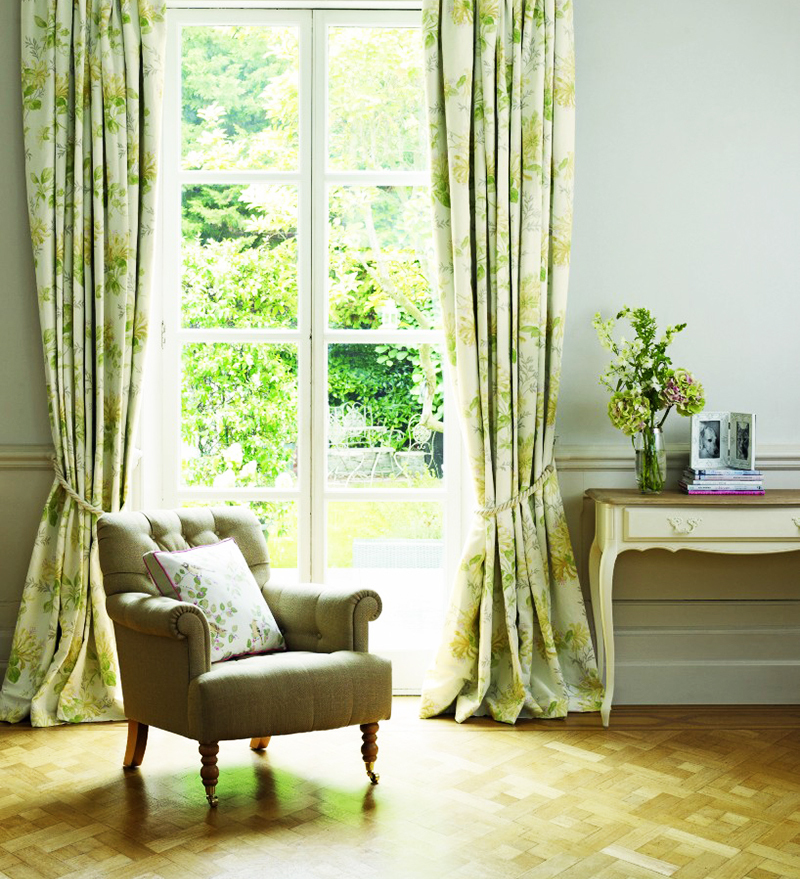Some housewives, updating the appearance of a particular room, wonder how to choose the right length of curtains. Some people are not even aware that there are certain standards. Today we will tell you what you need to consider in order to determine the ideal height of the curtains, and how to place them correctly on the window.
Read in the article
- 1 Length options in relation to the window sill
- 2 Width of canvases
- 3 How to calculate the size of the curtain for a standard window
Length options in relation to the window sill
There are three main options for placing curtains in relation to the windowsill: to the windowsill, just below the windowsill, or curtains to the floor. For each specific case, any of the three methods is chosen.

If one wide strip of fabric is enough for tulles, then for heavy wallpaper it is important to take into account that there will be two canvases. Depending on the severity of the fabric, it is worth choosing the gathering of the curtain.
Based on the curtain length option, length and width are usually taken into account with a margin for seam allowances.
If you chose the length to the window sill, then the lower edge of the curtain should be 1 cm above the window sill, so as not to hurt small objects that stand on it.

If you place the curtains just below the windowsill (this option is common for kitchens and living rooms), then the length margin should be 10-15 cm.
Advice! To measure distances, use a tape measure, not a centimeter. It has more headroom and can maintain correct position when bending.
If you chose the third option for floor-length curtains, be sure to take into account the sagging property of the fabric. This is true enough if you are using a soft curtain rod.
 PHOTO: roller blinds.dp.ua
PHOTO: roller blinds.dp.uaTo determine the length of the curtain, measure the distance from the top of the fixed rail or from the base of the rings on the rod to the intended position of the curtain at the bottom. Do not take into account the hem allowances for now, you will add them later when calculating the fabric consumption.
Width of canvases
The width of the canvases directly depends on the width of the cornice, and not the window itself. Material consumption is calculated based on its density and the type of attachment of curtains to the cornice. It is possible to calculate how much fabric is needed with sufficient accuracy, knowing the coefficient of gathering.
 PHOTO: pbs.twimg.com
PHOTO: pbs.twimg.comIf your window is located in the correct ratio to the ceiling, then traditionally the cornice is placed above the window at a distance of 7.5-12.5 cm. If the window is elongated ─ to brighten up the geometry and leave a margin, the cornice can be lowered as much as possible to the opening.
 PHOTO: museum-design.ru
PHOTO: museum-design.ruWhen calculating the width of the curtain on both sides, add 10 cm to the fold of the sides.
For fabrics with a printed or geometric pattern that repeats along its length (rapport), the flow rate can be increased by the length of this pattern. If the rapport size is 60 cm, the same amount of fabric must be bought in stock.
 PHOTO: tango-x.ru
PHOTO: tango-x.ruHow to calculate the size of the curtain for a standard window
We assume that the standard width of the cornice is 2 m. For a standard window, we take the standard size of curtains ─ 2.5 m, including seam allowances.
Consider the consumption of fabric depending on its type:
- Fabric consumption for tulle (according to the height of the fabric) = curtain height + bottom hem + top hem = 2.5 m + 0.15 m + 0.10 m = 2.75 m
- Fabric consumption for tulle (across the width of the fabric) = cornice length × assembly factor = 2 m × 2 = 4 m
- Fabric consumption for the curtain (by the height of the canvas) = curtain height + bottom hem + top hem = 2.5 m + 0.15 m + 0.10 m = 2.75 m
- Fabric consumption for curtains (across the width of the canvas) for one canvas = (length of the curtain rod × assembly factor): for the number of canvases = (2 m × 2): 2 = 2 m
If you liked the collection, be sure to like it and subscribe to our newsletter.



